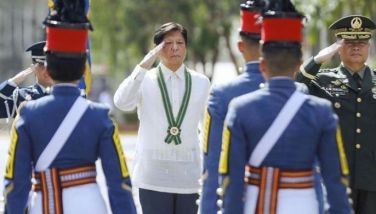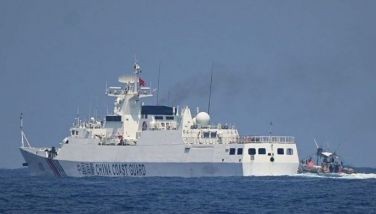PAASE letter to President Aquino
Dear President Aquino:
Warm greetings and congratulations from the Philippine-American Academy of Science and Engineering (PAASE) on your election as the President of the Philippines! PAASE is a professional organization of scientists and engineers of Philippine descent who hold Ph.D. or M.D. degrees, or both, and are in the forefront of scientific research and technology development in the United States, the Philippines and other countries. Starting with 27 founding members in 1980, the membership has now grown to 229. We are university professors, government and academic research scientists, policy makers, and lecturers in world-class academic institutions in the US, the Philippines, Europe, Australia and Asia. Some of us have the distinction of being elected members of the most prestigious and exclusive scientific and engineering academies of the US and the Philippines.
Our research activities span diverse fields of study: physics, chemistry, biology, medicine, mathematics, computer science and engineering and we are actively pursuing scientific and technological challenges facing our society. We are involved in the training of students in the Philippines and abroad, as we believe that the youth will shape the future of science and technology and economy of our country.
A primary objective of PAASE is to promote contacts and collaborations among Filipino scientists the world over and to help the Philippines in her efforts to advance science and engineering, teaching and research in our country. The challenges involved in significantly raising the economic welfare and well-being of Filipinos are daunting. But recognizing that the value of science is ultimately measured by its impact on society, it is crucial for us to commit to extend the fruits of science and technology to benefit our people through education, information dissemination, entrepreneurial activity, and commercialization. A high-level and expansive perspective is required to establish the value chain from basic to applied science, for the benefit of society.
It is in this light that PAASE is prepared to make major contributions to the Philippines, partly, through the highly successful Balik-Scientist Program (BSP) of the DOST, as well as through many other S&T advocacies. PAASE has been the major source of Balik-Scientists in the last three years. The Balik-Scientist Program of the DOST, after streamlining the application process and attractive packaging of incentives, was revitalized after many years of dormancy. PAASE seeks to continue active participation in this “brain gain” program of the DOST, to help train the next generation of Filipino scientists and engineers, conduct high quality research, and develop new, useful products - in the Philippines.
But these private initiatives, undertaken by individual scientists, are hardly enough. Much more needs to be done to bring our research climate to a level comparable to that in neighboring countries. A recent study by the Asian Institute of Management (R. E. Escobar, “Philippine Science and Technology: Environmental scanning of domestic and global issues,” AIM Policy Center) reveals that Thai scientists publish roughly three times as many scientific articles as their Filipino counterparts; Malaysian scientists, some two-and-a-half times more. Under favorable circumstances, however, Filipino scientists have shown themselves to be extremely productive. The publication records of PAASE members who find themselves in supportive research environments attest to this.
It is for this reason that we appeal to you for help. The current level of expenditure for research and development (R&D) in the Philippines is insufficient to support a research enterprise that is anywhere near commensurate to the needs of the country. The 2001 level of R&D spending was 0.078 percent of GDP, even lower than the 1992 level of 0.2 percent. In contrast, in 2001, Thailand and Malaysia spent 0.27 percent and 0.49 percent and of their respective GDP’s on R&D.
These differences in R&D funding levels are ultimately reflected in various measures of productivity. In 2000, the number of patents awarded to Philippine residents (per thousand R&D personnel) was 3.5. The corresponding numbers for Malaysia and Thailand are 7.1 and 81.3, respectively. These disparities translate into disparities in the production of goods and services and ultimately in such measures of economic vitality as the GDP growth rate. According to the World Bank, in 2004, the Philippine per capita GDP was $1,170; the corresponding figures for Thailand and Malaysia are $2,540 and $4,650 respectively. Official data show that while Philippine GDP growth rate per capita was a meager one percent per annum during 1991-2003 (following -0.5 percent GDP per capita growth in the 1980s), the corresponding growth rates in Malaysia and Thailand were about 3.5 percent.
Current Philippine expenditures for R&D are way below the medium-term target of 1.0 percent of GDP set by the DOST’s National Science and Technology Plan, which expressed the hope of attaining this target in 2010.
We ask that you increase the government support of research in science and technology to 0.5 percent of GDP. This represents only half of the National Science and Technology Plan target for 2010, but it would be a tremendous start. These additional funds could be coursed through the DOST which would allocate funds through its usual research grant funding processes. An increase in research allocation would also have an immediate impact on science and technology education at the tertiary level as well as on the training of young research scientists, and will certainly provide incentives for trained researchers to stay in the Philippines rather than seek opportunities abroad.
Respectfully yours,
Onofre T. De Jesus, Ph.D.
President, PAASE
Professor of Medical Physics
University of Wisconsin-Madison
Maria Luisa Virata-Theimer, Ph.D.
Chairman of the Board, PAASE
Regulatory Review Scientist
US Food and Drug Administration
* * *
The 31st Annual PAASE Meeting and Symposium (31APAMS) will be held on June 15-18, 2011 at the National Science Complex in UP Diliman. Scientists, engineers, researchers, graduate students, techno-entrepreneurs, business and industry leaders, science educators and administrators from the government and private sectors, media representatives, and the general public are invited to attend 31APAMS to participate in output/action-driven FGDs (Focus Group Discussions) on various pressing S,E&T issues in the country, and to listen to scientific and technical talks by leading Filipino scientists and engineers from here and abroad. Commercializable technologies and discoveries of our scientists and engineers will be exhibited and presented to potential investors. For more information, e-mail Gisela P. Concepcion, PhD, current PAASE vice president and incoming PAASE president in 2011 at [email protected]. Visit www.paase.org for details about 31APAMS starting Jan. 1, 2011. For comments on the article, e-mail at [email protected] or [email protected].
- Latest




























